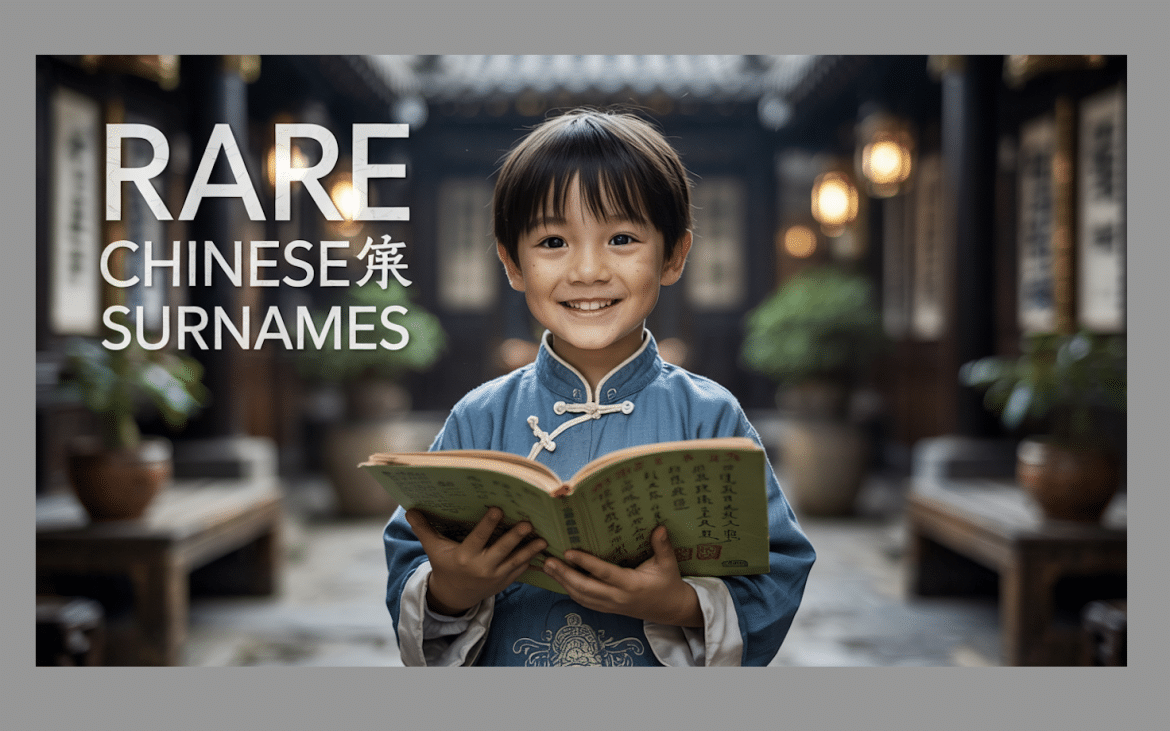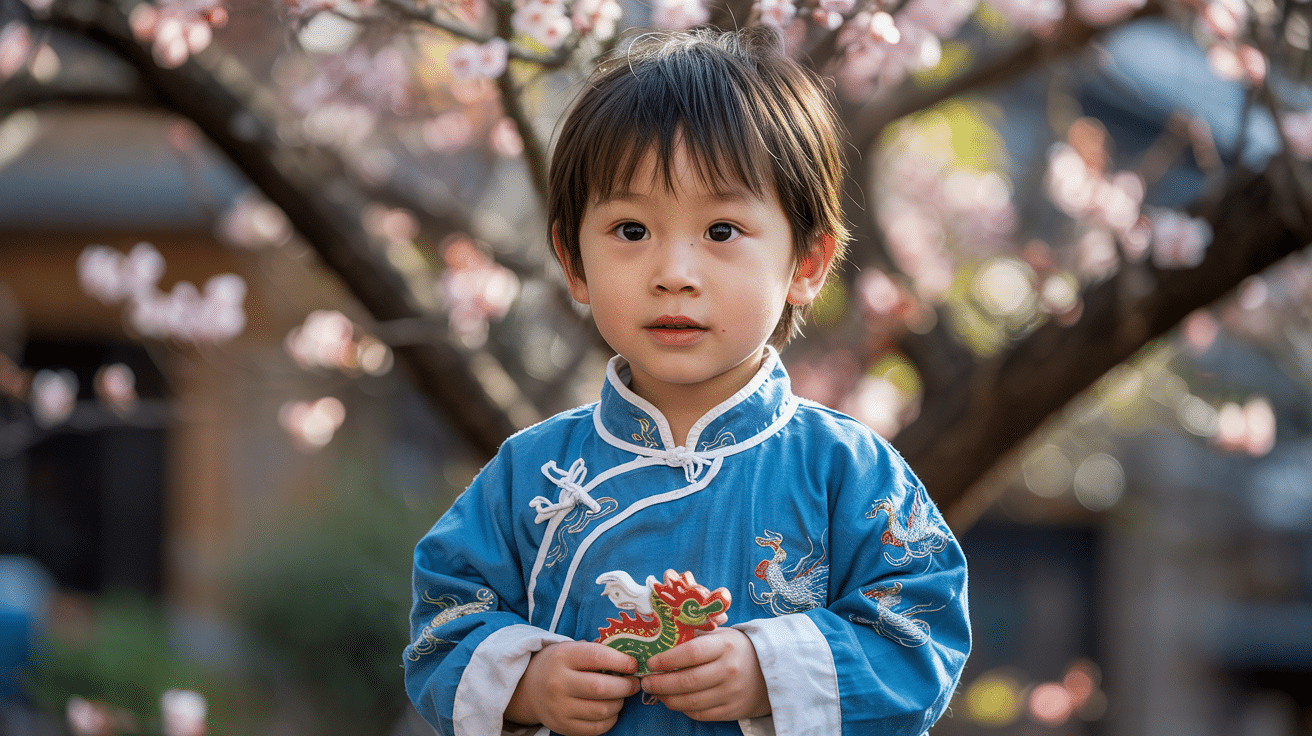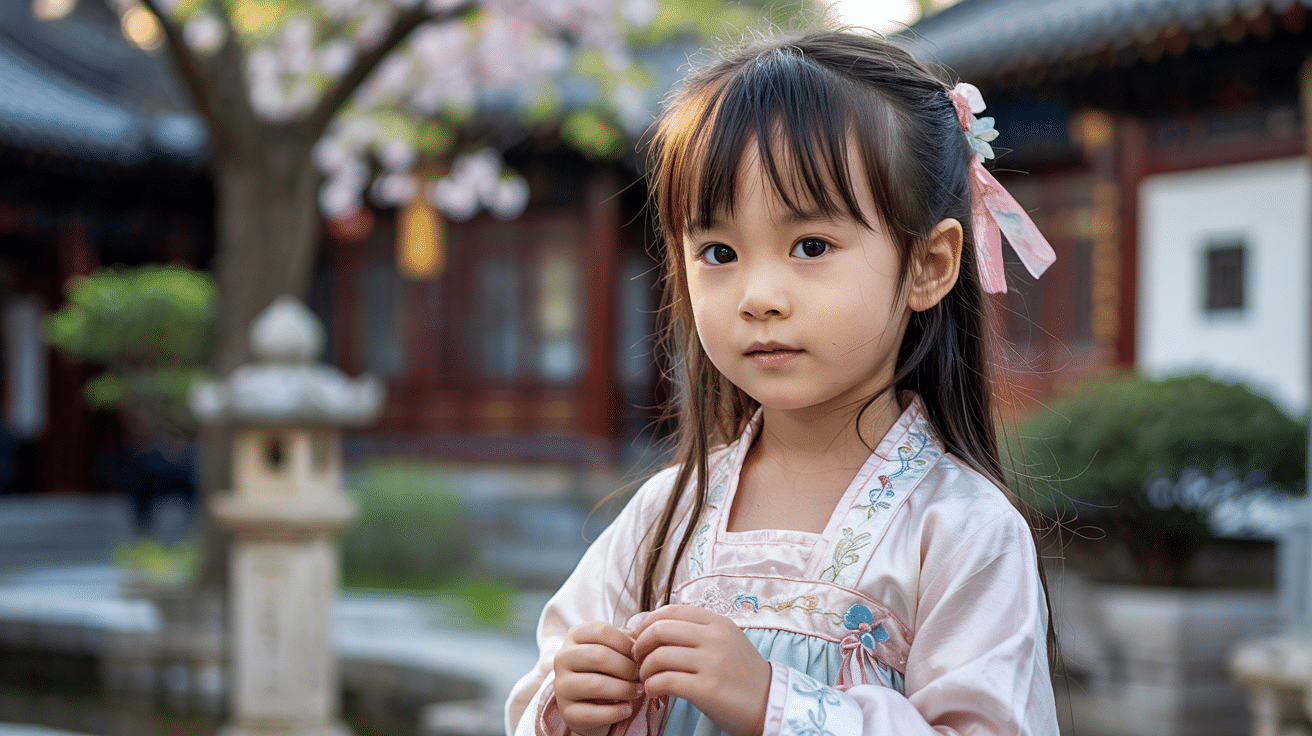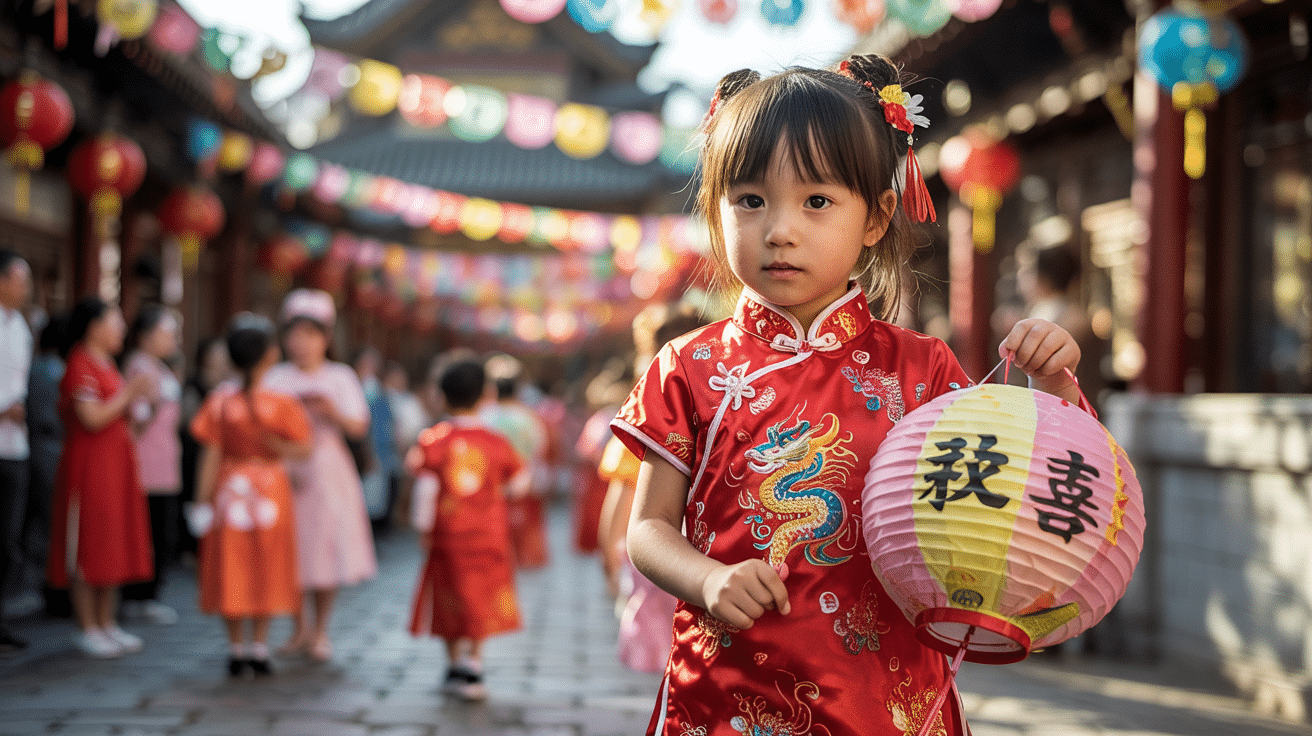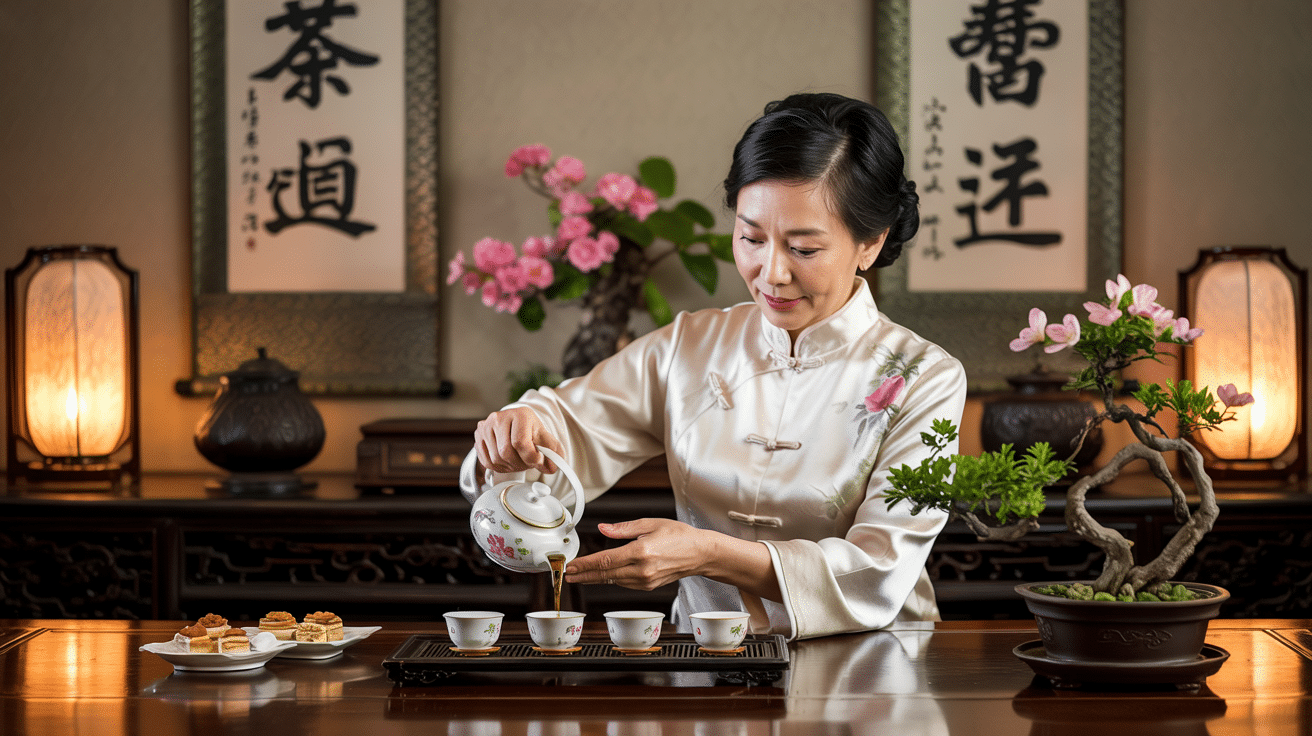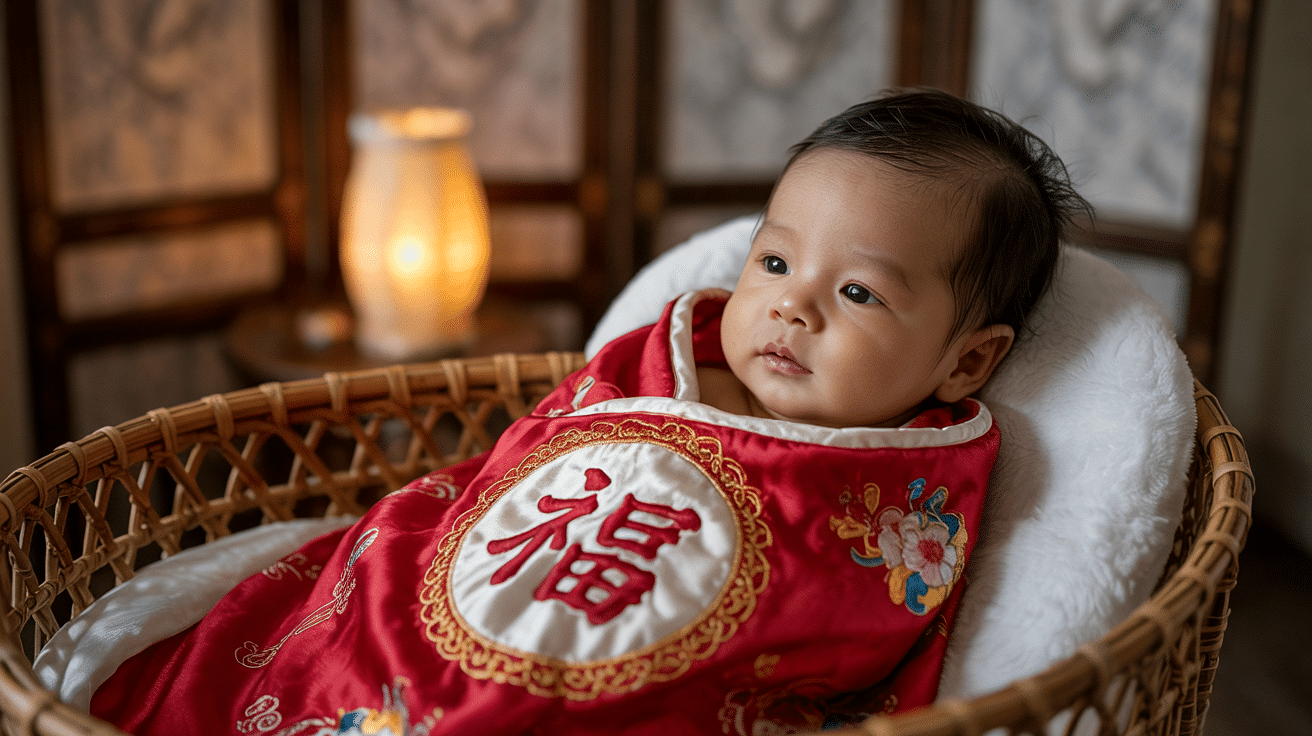Have you ever wondered what stories lie behind the names we carry? In China, where over 6,000 surnames exist, the rarest ones offer interesting windows into history.
While common names like Li, Wang, and Zhang dominate, “rare Chinese surnames like Zhūgě, Mùróng, and Tuòbá “remain precious cultural treasures, with some claimed by fewer than 1,000 people nationwide.
What makes these names special? Each rare surname contains unique tales of ancient dynasties, ethnic minorities, literary inspiration, or isolated communities.
Come along as we are going to find these hidden gems of Chinese heritage, where every name tells a story.
The Significance of Chinese Surnames
Chinese surnames stand among the world’s oldest naming traditions, with records dating back to the Shang Dynasty over 5,000 years ago.
While Western societies broadly adopted surnames only around the 13th century, Chinese culture had already used them for thousands of years. They carry profound cultural weight:
- Historical Depth: Originated in Shang Dynasty (1600-1046 BCE), initially for nobility, later for all social classes
- Structural Differences: Chinese puts surname first (family above individual); derived from ancient states, landmarks, or titles rather than occupations or patronymics
- Family Connection: Surnames link individuals to ancestry through detailed genealogical records (族谱/zúpǔ) that preserve family history across many generations
- Regional Identity: Many surnames indicate geographical origins, providing clues about historical migration patterns within China
- Stability Through Change: Women traditionally kept birth surnames after marriage, maintaining family lines across generations
These naming traditions remain central to Chinese identity worldwide, representing both heritage and filial responsibility.
Rare & Obsolete Chinese Surnames
Venturing beyond familiar names like Li and Wang, this collection of seldom-seen Chinese surnames reveals forgotten histories and cultural treasures preserved by just a handful of families today.
1. Fú (宓)
Pronunciation: /foo/
Meaning: Quiet, peaceful, serene
2. Gōu (缑)
Pronunciation: /goh/
Meaning: Curved, winding, hook-shaped
3. Pú (濮)
Pronunciation: /poo/
Meaning: River waters, flowing stream
4. Jū (鞠)
Pronunciation: /joo/
Meaning: To nurture, raise, cultivate
5. Páng (逄)
Pronunciation: /pahng/
Meaning: To meet by chance, encounter
6. Yāng (鞅)
Pronunciation: /yahng/
Meaning: Horse harness, restraint
7. Yángshé (羊舌)
Pronunciation: /yahng-sheh/
Meaning: Sheep tongue, eloquent speaker
8. Gōngyě (公冶)
Pronunciation: /gohng-yeh/
Meaning: Public metallurgy, skilled metalworker
9. Dōngmén (东门)
Pronunciation: /dohng-men/
Meaning: East gate, eastern entrance
10. Nángōng (南宫)
Pronunciation: /nahn-gohng/
Meaning: Southern palace, royal southern residence
11. Huángfǔ (皇甫)
Pronunciation: /hwahng-foo/
Meaning: Imperial tutor, royal advisor
12. Zhūgě (诸葛)
Pronunciation: /joo-geh/
Meaning: Many weapons, skilled strategist
13. Dìwǔ (第五)
Pronunciation: /dee-woo/
Meaning: The fifth, fifth in sequence
14. Sīkòu (司寇)
Pronunciation: /see-koh/
Meaning: Minister of justice, law enforcer
15. Lìnghú (令狐)
Pronunciation: /ling-hoo/
Meaning: Commanding fox, clever leader
16. Shēntú (申屠)
Pronunciation: /shen-too/
Meaning: Extended butcher, meat official
17. Zhòngsūn (仲孙)
Pronunciation: /johng-soon/
Meaning: Middle grandson, second generation descendant
18. Duānmù (端木)
Pronunciation: /dwahn-moo/
Meaning: Upright timber, person of integrity
19. Bǎilǐ (百里)
Pronunciation: /bye-lee/
Meaning: Hundred miles, vast territory
20. Gǔliáng (谷梁)
Pronunciation: /goo-lyahng/
Meaning: Valley bridge, mountain pass connector
21. Rǎngsì (壤驷)
Pronunciation: /rahng-suh/
Meaning: Soil team, earth handlers
22. Zhǎngsūn (长孙)
Pronunciation: /jahng-soon/
Meaning: Elder grandson, senior descendant
23. Hūyán (呼延)
Pronunciation: /hoo-yen/
Meaning: Calling extension, prolonged sound
24. Jiágǔ (夹谷)
Pronunciation: /jyah-goo/
Meaning: Between valleys, mountain dweller
25. Tuòbá (拓拔)
Pronunciation: /twoh-bah/
Meaning: Territory expander, land developer
26. Yǔwén (宇文)
Pronunciation: /yoo-wen/
Meaning: Universe script, cosmic writing
27. Hèlián (赫连)
Pronunciation: /heh-lyen/
Meaning: Bright connection, radiant link
28. Mùróng (慕容)
Pronunciation: /moo-rohng/
Meaning: Admired appearance, respected presence
29. Yùchí (尉迟)
Pronunciation: /yoo-chee/
Meaning: Delayed officer, patient commander
30. Lǘqiū (闾丘)
Pronunciation: /lyoo-chyoh/
Meaning: Village hill, community mound
31. Dōngguō (东郭)
Pronunciation: /dohng-gwoh/
Meaning: Eastern wall, east city outskirts
32. Púyáng (濮阳)
Pronunciation: /poo-yahng/
Meaning: North of Pu River, riverside settlement
33. Tàishū (太叔)
Pronunciation: /tai-shoo/
Meaning: Great uncle, senior paternal relative
34. Gōngsūn (公孙)
Pronunciation: /gohng-soon/
Meaning: Duke’s grandson, noble descendant
35. Gōngyáng (公羊)
Pronunciation: /gohng-yahng/
Meaning: Public ram, communal livestock keeper
36. Nánmén (南门)
Pronunciation: /nahn-men/
Meaning: South gate, southern entrance
37. Běitáng (北堂)
Pronunciation: /bay-tahng/
Meaning: North hall, northern chamber
38. Zhōnglí (锺离)
Pronunciation: /johng-lee/
Meaning: Bell separator, musical instrument maker
39. Wēishēng (微生)
Pronunciation: /way-sheng/
Meaning: Slight life, humble existence
40. Yángjiǎo (羊角)
Pronunciation: /yahng-jyow/
Meaning: Sheep horn, curved protrusion
41. Xiàhóu (夏侯)
Pronunciation: /shyah-ho/
Meaning: Summer marquis, warm season noble
42. Zōngzhèng (宗政)
Pronunciation: /zohng-jeng/
Meaning: Ancestral government, clan administration
43. Zhòngcháng (仲长)
Pronunciation: /johng-chahng/
Meaning: Middle elder, central authority figure
44. Zǐchē (子车)
Pronunciation: /dzuh-cheh/
Meaning: Child carriage, youth transport
45. Duàngān (段干)
Pronunciation: /dwahn-gahn/
Meaning: Section stem, divided trunk
46. Sīmǎ (司马)
Pronunciation: /see-mah/
Meaning: Horse administrator, cavalry commander
47. Liángqiū (梁丘)
Pronunciation: /lyahng-chyoh/
Meaning: Bridge hill, elevated crossing
48. Dōnglǐ (东里)
Pronunciation: /dohng-lee/
Meaning: East village, eastern settlement
49. Xīmén (西门)
Pronunciation: /shee-men/
Meaning: West gate, western entrance
50. Nánróng (南荣)
Pronunciation: /nahn-rohng/
Meaning: Southern honor, praise from south
51. Mòqí (万俟)
Pronunciation: /moh-chee/
Meaning: Ten thousand awaiting, countless patience
52. Gōngliáng (公良)
Pronunciation: /gohng-lyahng/
Meaning: Public goodness, community kindness
53. Gōnghù (公户)
Pronunciation: /gohng-hoo/
Meaning: Public household, community family
54. Gōngshàng (公上)
Pronunciation: /gohng-shahng/
Meaning: Public superior, community leader
55. Gōngyí (公仪)
Pronunciation: /gohng-yee/
Meaning: Public ceremony, community ritual
56. Gōngzhòng (公仲)
Pronunciation: /gohng-johng/
Meaning: Public middle, community center
57. Gōngshèng (公乘)
Pronunciation: /gohng-sheng/
Meaning: Public vehicle, community transport
58. Gōngjiǎ (公甲)
Pronunciation: /gohng-jyah/
Meaning: Public armor, community protection
59. Gōngzǔ (公祖)
Pronunciation: /gohng-dzoo/
Meaning: Public ancestor, community forefather
60. Gōngféng (公冯)
Pronunciation: /gohng-feng/
Meaning: Public abundance, community wealth
Surnames with Ethnic Minority Origins
These surnames originated among China’s diverse ethnic minority groups, reflecting cultural influences from Manchu, Mongol, Jurchen, and other non-Han populations throughout Chinese history.
61. Tuòbá (拓跋)
Pronunciation: /twoh-bah/
<strong”>Meaning: Territory expansion, frontier development
62. Wányán (完颜)
Pronunciation: /wahn-yen/
Meaning: Complete countenance, perfect face
63. Yēlǜ (耶律)
Pronunciation: /yeh-lyoo/
Meaning: Questioning laws, legal examiner
64. Wūyǎ (乌雅)
Pronunciation: /woo-yah/
Meaning: Black crow grace, dark beauty
65. Nàlán (纳兰)
Pronunciation: /nah-lahn/
Meaning: Accepting orchid, flower embracer
66. Fèimò (费莫)
Pronunciation: /fay-moh/
Meaning: Bountiful expenditure, generous spender
67. Fùchá (富察)
Pronunciation: /foo-chah/
Meaning: Wealth inspector, riches examiner
68. Guā’ěrjiā (瓜尔佳)
Pronunciation: /gwah-er-jyah/
Meaning: Melon goodness, fruit quality
69. Dǒng’è (董鄂)
Pronunciation: /dohng-uh/
Meaning: Supervising surprise, management astonishment
70. Mǎjiā (马佳)
Pronunciation: /mah-jyah/
Meaning: Good horse, fine steed
71. Hónglì (弘历)
Pronunciation: /hohng-lee/
Meaning: Grand calendar, expansive timekeeper
72. Sàkèdá (萨克达)
Pronunciation: /sah-keh-dah/
Meaning: Respectful achiever, honorable attainer
73. Shímǒ (石抹)
Pronunciation: /shir-moh/
Meaning: Stone wiper, rock polisher
74. Hūtúkètú (呼图克图)
Pronunciation: /hoo-too-keh-too/
Meaning: Map caller, chart summoner
75. Shuāngxǐ (双喜)
Pronunciation: /shwahng-shee/
Meaning: Double happiness, paired joy
76. Dōulán (都兰)
Pronunciation: /doh-lahn/
Meaning: Capital blue, city azure
77. Shūmùlù (舒穆禄)
Pronunciation: /shoo-moo-loo/
Meaning: Comfortable record, cozy documentation
78. Bāyǎlā (巴雅拉)
Pronunciation: /bah-yah-lah/
Meaning: Refined wish, polished desire
79. Tègǔsī (特古斯)
Pronunciation: /teh-goo-suh/
Meaning: Special ancient one, unique olden person
80. Ālātǎn (阿拉坦)
Pronunciation: /ah-lah-tan/
Meaning: Slope altar, hillside shrine
81. Hādá (哈达)
Pronunciation: /hah-dah/
Meaning: Laughter reach, joy attainment
82. Chágàn (查干)
Pronunciation: /chah-gahn/
Meaning: Investigation seeker, examination pursuer
83. Túmén (图门)
Pronunciation: /too-men/
Meaning: Map gate, chart entrance
84. É’ěrdéní (额尔德尼)
Pronunciation: /uh-er-deh-nee/
Meaning: Forehead virtue, brow goodness
85. Mènghé (孟和)
Pronunciation: /meng-huh/
Meaning: First harmony, primary concord
86. Cháokètú (朝克图)
Pronunciation: /chow-keh-too/
Meaning: Morning conquest map, dawn victory chart
87. Wūlìjí (乌力吉)
Pronunciation: /woo-lee-jee/
Meaning: Black strength luck, dark power fortune
88. Ténggé’ěr (腾格尔)
Pronunciation: /teng-guh-er/
Meaning: Soaring pattern, rising design
89. Wūrìtú (乌日图)
Pronunciation: /woo-rih-too/
Meaning: Black sun map, dark day chart
90. Xīlín (锡林)
Pronunciation: /shee-lin/
Meaning: Tin forest, metal woods
91. Zhámùhé (札木合)
Pronunciation: /jah-moo-huh/
Meaning: Note wood combination, document timber union
92. Tǔmòtè (土默特)
Pronunciation: /too-moh-teh/
Meaning: Earth silence special, soil quiet uniqueness
93. Bǎoyīn (宝音)
Pronunciation: /bow-yin/
Meaning: Treasure sound, precious tone
94. Húqítú (胡其图)
Pronunciation: /hoo-chee-too/
Meaning: Beard its map, whisker chart
95. Tèbù (特布)
Pronunciation: /teh-boo/
Meaning: Special cloth, unique fabric
96. Yīkètáng’ā (依克唐阿)
Pronunciation: /yee-keh-tahng-ah/
Meaning: Depending on hall slope, leaning chamber incline
97. Qímòtè (齐默特)
Pronunciation: /chee-moh-teh/
Meaning: Even silence special, uniform quiet uniqueness
98. Wūlán (乌兰)
Pronunciation: /woo-lahn/
Meaning: Black blue, dark azure
99. Hāsībāgēn (哈斯巴根)
Pronunciation: /hah-suh-bah-gen/
Meaning: Laughing this root, joyful base
100. Hābùtú (哈布图)
Pronunciation: /hah-boo-too/
Meaning: Laughing cloth map, joyful fabric chart
101. Túbùxīn (图布新)
Pronunciation: /too-boo-shin/
Meaning: Map cloth new, chart fabric fresh
102. Gālǎhā (嘎拉哈)
Pronunciation: /gah-lah-hah/
Meaning: Cracking pull laugh, breaking draw joy
103. Démùchǔkè (德穆楚克)
Pronunciation: /deh-moo-choo-keh/
Meaning: Virtue solemn clear conquest, moral serious transparent victory
104. Húnchūn (珲春)
Pronunciation: /hwen-chwen/
Meaning: Jade spring, precious vernal season
105. Ālāténg (阿拉腾)
Pronunciation: /ah-lah-teng/
Meaning: Slope pull rise, incline drawing ascent
106. Wūzhé (乌哲)
Pronunciation: /woo-jeh/
Meaning: Black wisdom, dark intelligence
107. Yī’ěrgēnjuéluó (伊尔根觉罗)
Pronunciation: /yee-er-gen-jweh-lwoh/
Meaning: This root awareness net, such base consciousness mesh
108. Niǔhùlù (钮祜禄)
Pronunciation: /nyoh-hoo-loo/
Meaning: Button blessing deer, fastener fortune stag
109. Fèiyīngdōng (费英东)
Pronunciation: /fay-ying-dohng/
Meaning: Expense hero east, cost brave sunrise
110. Fó’ěrdūn (佛尔敦)
Pronunciation: /foh-er-dwen/
Meaning: Buddha thus honest, enlightened one truthful
111. Wūdūn (乌敦)
Pronunciation: /woo-dwen/
Meaning: Black honest, dark truthful
112. Mǎhé (马和)
Pronunciation: /mah-huh/
Meaning: Horse and, steed with
113. Lùdōngzàn (禄东赞)
Pronunciation: /loo-dohng-dzahn/
Meaning: Salary east praise, payment sunrise compliment
114. Lǐyuánhào (李元昊)
Pronunciation: /lee-ywen-how/
Meaning: Plum origin brave, fruit source courageous
115. Xīnuòluó (悉诺逻)
Pronunciation: /shee-nwoh-lwoh/
Meaning: Detailed promise net, thorough pledge mesh
116. Yānshì (阏氏)
Pronunciation: /yahn-shir/
Meaning: Blocked clan, obstructed family
117. Tūfā (秃发)
Pronunciation: /too-fah/
Meaning: Bald hair, hairless head
118. Mùróngjùn (慕容儁)
Pronunciation: /moo-rohng-jwen/
Meaning: Admire appearance outstanding, respect looks exceptional
119. Bùliùgū (步六孤)
Pronunciation: /boo-lyoh-goo/
Meaning: Walk six lone, stride six solitary
120. Yǐzhānshì (乙旃氏)
Pronunciation: /yee-jahn-shir/
Meaning: Second felt clan, runner-up fabric family
Literary & Poetic Surnames
These surnames draw from classical literature, poetic imagery, and artistic traditions, embodying Chinese cultural appreciation for literary refinement and artistic expression.
121. Fú (苻)
Pronunciation: /foo/
Meaning: Calamus plant, aromatic reed
122. Wū (於)
Pronunciation: /woo/
Meaning: At location, in place
123. Zī (訾)
Pronunciation: /dzuh/
Meaning: Criticism, negative assessment
124. Yān (鄢)
Pronunciation: /yahn/
Meaning: Ancient place name, historic location
125. Qiú (仇)
Pronunciation: /chyoh/
Meaning: Enemy, foe or adversary
126. Zǎifǔ (宰父)
Pronunciation: /dzye-foo/
Meaning: Butcher father, slaughterer patriarch
127. Chìsōng (赤松)
Pronunciation: /chih-sohng/
Meaning: Red pine, ruddy conifer
128. Dānzhū (丹朱)
Pronunciation: /dahn-joo/
Meaning: Cinnabar vermilion, red pigment
129. Cāngzhú (苍术)
Pronunciation: /tsahng-shoo/
Meaning: Green atractylodes herb, blue medicinal plant
130. Jí (汲)
Pronunciation: /jee/
Meaning: Draw water, fetch liquid
131. Bǐng (邴)
Pronunciation: /bing/
Meaning: Ancient state name, historic region
132. Cháng (苌)
Pronunciation: /chahng/
Meaning: Plant name, vegetation type
133. Róng (戎)
Pronunciation: /rohng/
Meaning: Military, martial or warlike
134. Ní (倪)
Pronunciation: /nee/
Meaning: Small amount, tiny portion
135. Biàn (卞)
Pronunciation: /byen/
Meaning: Hasty, hurried or impatient
136. Chōng (充)
Pronunciation: /chohng/
Meaning: Fill up, satisfy or complete
137. Zuǒqiū (左丘)
Pronunciation: /dzwoh-chyoh/
Meaning: Left hill, leftward mound
138. Huáyáng (华阳)
Pronunciation: /hwah-yahng/
Meaning: Splendid sunshine, magnificent daylight
139. Mǐ (芈)
Pronunciation: /mee/
Meaning: Ancient state name, historic region
140. Lěng (冷)
Pronunciation: /leng/
Meaning: Cold, chilly or frigid
141. Yīn (阴)
Pronunciation: /yin/
Meaning: Shady, cloudy or overcast
142. Cóng (丛)
Pronunciation: /tsohng/
Meaning: Cluster, thicket or gathering
143. Lán (蓝)
Pronunciation: /lahn/
Meaning: Blue, indigo or azure
144. Hán (邗)
Pronunciation: /hahn/
Meaning: River name, waterway designation
145. Zǎn (昝)
Pronunciation: /dzahn/
Meaning: Dawn, early morning light
146. Gū (辜)
Pronunciation: /goo/
Meaning: Crime, offense or guilt
147. Lù (逯)
Pronunciation: /loo/
Meaning: Careful walking, cautious movement
148. Xiǎn (冼)
Pronunciation: /shyen/
Meaning: To wash, cleanse or purify
149. Yín (訚)
Pronunciation: /yin/
Meaning: Loud speaking, noisy talking
150. Zhòng (种)
Pronunciation: /johng/
Meaning: Seed, type or variety
151. Qīng (卿)
Pronunciation: /ching/
Meaning: Minister, high official or noble
152. Jì (暨)
Pronunciation: /jee/
Meaning: And, also or reaching to
153. Mǐ (弭)
Pronunciation: /mee/
Meaning: Stop, quell or suppress
154. Kē’ěrkèzī (柯尔克孜)
Pronunciation: /keh-er-keh-dzuh/
Meaning: Branch character overcoming, twig personality conquering
155. Yù (鬱)
Pronunciation: /yoo/
Meaning: Dense, fragrant or melancholy
156. Quán (泉)
Pronunciation: /chwen/
Meaning: Spring, fountain or water source
157. Shāng (商)
Pronunciation: /shahng/
Meaning: Commerce, trade or discussion
158. Qiū (秋)
Pronunciation: /chyoh/
Meaning: Autumn, fall or harvest season
159. Láo (劳)
Pronunciation: /low/
Meaning: Labor, toil or working hard
160. Sōng (松)
Pronunciation: /sohng/
Meaning: Pine tree, evergreen conifer
161. Shī (诗)
Pronunciation: /shir/
Meaning: Poetry, verse or lyrical composition
162. Yān (烟)
Pronunciation: /yen/
Meaning: Smoke, mist or vapor
163. Qín (琴)
Pronunciation: /chin/
Meaning: Musical instrument, string zither
164. Jūn (筠)
Pronunciation: /jwen/
Meaning: Bamboo skin, plant fiber
165. Jī (嵇)
Pronunciation: /jee/
Meaning: Mountain name, geographic feature
166. Chǔ (储)
Pronunciation: /choo/
Meaning: Store, save or accumulate
167. Zīwén (訾文)
Pronunciation: /dzuh-wen/
Meaning: Critique writing, assess composition
168. Niè (聂)
Pronunciation: /nyeh/
Meaning: Whisper, speak quietly or murmur
169. Sù (宿)
Pronunciation: /soo/
Meaning: Lodge, stay or celestial station
170. Pán (盘)
Pronunciation: /pahn/
Meaning: Plate, dish or circular container
171. Kuàng (况)
Pronunciation: /kwahng/
Meaning: Situation, condition or circumstances
172. Jí (籍)
Pronunciation: /jee/
Meaning: Book, register or record
173. Xiè (解)
Pronunciation: /shyeh/
Meaning: Untie, solve or explain
174. Bēn (贲)
Pronunciation: /ben/
Meaning: Energetic, vigorous or strong
175. Tóng (佟)
Pronunciation: /tohng/
Meaning: Tall and straight, upright posture
176. Zāng (臧)
Pronunciation: /dzahng/
Meaning: Good, proper or beneficial
177. Liào (廖)
Pronunciation: /lyow/
Meaning: Far, distant or remote
178. Qīdiāo (漆雕)
Pronunciation: /chee-dyow/
Meaning: Lacquer carving, painted sculpture
Regionally Isolated or Lost Surnames
These surnames once flourished in specific regions or remote areas of China but have gradually faded from common use, with some now preserved by only a few families or in historical records.
179. Luán (栾)
Pronunciation: /lwahn/
Meaning: Straight tree, upright timber
180. Cén (岑)
Pronunciation: /tsen/
Meaning: Small hill, minor peak
181. Zhǎng (仉)
Pronunciation: /jahng/
Meaning: Rise up, grow taller
182. Xī (郗)
Pronunciation: /shee/
Meaning: Creek, small stream or brook
183. Zhuó (禚)
Pronunciation: /jwoh/
Meaning: Bright, clear or illuminated
184. Kuí (隗)
Pronunciation: /kway/
Meaning: High, lofty or towering
185. Gào (郜)
Pronunciation: /gow/
Meaning: Village name, settlement designation
186. Hú (斛)
Pronunciation: /hoo/
Meaning: Grain measure, volume container
187. Zhōng (锺)
Pronunciation: /johng/
Meaning: Bell, musical percussion instrument
188. Fúsū (扶苏)
Pronunciation: /foo-soo/
Meaning: Support revival, assist restoration
189. Jùmáng (句芒)
Pronunciation: /jyoo-mahng/
Meaning: Spring deity, growth god
190. Rènshān (任山)
Pronunciation: /ren-shahn/
Meaning: Sustain mountain, support peak
191. Jiǎrén (贾人)
Pronunciation: /jyah-ren/
Meaning: Merchant person, trader individual
192. Xún (荀)
Pronunciation: /shwen/
Meaning: Bamboo sprout, young shoot
193. Zōng (宗)
Pronunciation: /dzohng/
Meaning: Ancestor, clan or lineage
194. Mí (糜)
Pronunciation: /mee/
Meaning: Porridge, rice gruel or millet
195. Lěngqiān (冷谦)
Pronunciation: /leng-chyen/
Meaning: Cold modest, chilly humble
196. Gāoyáo (皋陶)
Pronunciation: /gow-yow/
Meaning: High pottery, tall ceramics
197. Mí (祢)
Pronunciation: /mee/
Meaning: Ancestral worship, forebear reverence
198. Jī (箕)
Pronunciation: /jee/
Meaning: Winnowing basket, grain separator
199. Féngyì (冯翊)
Pronunciation: /feng-yee/
Meaning: Gallop wings, running flight
200. Mǎn (满)
Pronunciation: /mahn/
Meaning: Full, complete or entire
201. Wū (邬)
Pronunciation: /woo/
Meaning: Mound, hillock or grave
202. Móu (牟)
Pronunciation: /moh/
Meaning: Seek, strive or obtain
203. Huàn (宦)
Pronunciation: /hwahn/
Meaning: Official, servant or government worker
204. Cāo (操)
Pronunciation: /tsow/
Meaning: Hold, grasp or control
205. Chōngguó (充国)
Pronunciation: /chohng-gwoh/
Meaning: Fill country, satisfy nation
206. Zhù (祝)
Pronunciation: /joo/
Meaning: Blessing, prayer or good wish
207. Zītú (訾涂)
Pronunciation: /dzuh-too/
Meaning: Critique application, assessment application
208. Láo (牢)
Pronunciation: /low/
Meaning: Firm, prison or stable
209. Mǐn (闵)
Pronunciation: /min/
Meaning: Pity, grief or compassion
210. Xī (奚)
Pronunciation: /shee/
Meaning: What, why or query
211. Wú (毋)
Pronunciation: /woo/
Meaning: Do not, negative command
212. Qiè (郄)
Pronunciation: /chyeh/
Meaning: Interior, inner part or within
213. Zhǎn (展)
Pronunciation: /jahn/
Meaning: Spread, unfold or display
214. Yǔ (庾)
Pronunciation: /yoo/
Meaning: Granary, storehouse or depot
215. Duān (端)
Pronunciation: /dwahn/
Meaning: Upright, correct or proper
216. Jiǎo (矫)
Pronunciation: /jyow/
Meaning: Rectify, correct or straighten
217. Suǒ (索)
Pronunciation: /swoh/
Meaning: Search, seek or rope
218. Yú (鱼)
Pronunciation: /yoo/
Meaning: Fish, aquatic creature
219. Huì (惠)
Pronunciation: /hway/
Meaning: Kindness, favor or benefit
220. Qī (戚)
Pronunciation: /chee/
Meaning: Relative, close relation or kin
221. Tái (邰)
Pronunciation: /tye/
Meaning: Ancient state name, historic region
222. Fēng (丰)
Pronunciation: /feng/
Meaning: Abundant, plentiful or bountiful
223. Yú (虞)
Pronunciation: /yoo/
Meaning: Worry, concern or anxiety
224. Tán (郯)
Pronunciation: /tahn/
Meaning: Place name, location designation
225. Fēng (酆)
Pronunciation: /feng/
Meaning: Place name, location designation
226. Yī (伊)
Pronunciation: /yee/
Meaning: That, this or he/she
227. Pí (皮)
Pronunciation: /pee/
Meaning: Skin, hide or leather
228. Chǔ (褚)
Pronunciation: /choo/
Meaning: Clothing wrap, garment cover
229. Tán (谈)
Pronunciation: /tahn/
Meaning: Talk, discuss or converse
230. Fú (扶)
Pronunciation: /foo/
Meaning: Support, assist or help
231. Kàn (阚)
Pronunciation: /kahn/
Meaning: Look, see or observe
232. Shēn (莘)
Pronunciation: /shen/
Meaning: Tall grass, high vegetation
233. Mǎndūlā (满都拉)
Pronunciation: /mahn-doo-lah/
Meaning: Full capital pull, complete city draw
234. Zhòng (仲)
Pronunciation: /johng/
Meaning: Middle, second month or central
235. Tú (涂)
Pronunciation: /too/
Meaning: Path, road or to smear
236. Yīqí (伊祁)
Pronunciation: /yee-chee/
Meaning: This prayer, that petition
237. Shòu (寿)
Pronunciation: /show/
Meaning: Longevity, lifespan or long life
Reconstructed or Modernized Surnames
These surnames represent newer additions to the Chinese naming landscape, having emerged through romanization, legal name changes, or creative adaptations of traditional characters in modern times.
238. Ài’ěr (艾尔)
Pronunciation: /eye-er/
Meaning: Wormwood thus, mugwort so
239. Āndéliè (安德烈)
Pronunciation: /ahn-deh-lyeh/
Meaning: Peace virtue strong, tranquility moral powerful
240. Hèlán (贺兰)
Pronunciation: /heh-lahn/
Meaning: Congratulate orchid, celebrate flower
241. Kǎ’ěr (卡尔)
Pronunciation: /kah-er/
Meaning: Card thus, card so
242. Mǎxī (马西)
Pronunciation: /mah-shee/
Meaning: Horse west, steed occidental
243. Xīlín (西林)
Pronunciation: /shee-lin/
Meaning: West forest, western woods
244. Lǐzhuówú (李卓吾)
Pronunciation: /lee-jwoh-woo/
Meaning: Plum outstanding none, fruit exceptional nothing
245. Lěngxīn (冷欣)
Pronunciation: /leng-shin/
Meaning: Cold joy, chilly delight
246. Lánsī (蓝思)
Pronunciation: /lahn-suh/
Meaning: Blue thought, azure thinking
247. Wéntāo (文涛)
Pronunciation: /wen-tow/
Meaning: Text wave, writing tide
248. Zhì (智)
Pronunciation: /jir/
Meaning: Wisdom, intelligence or knowledge
249. Ōulā (欧拉)
Pronunciation: /oh-lah/
Meaning: Europe pull, occidental draw
250. Yuèzhèng (乐正)
Pronunciation: /yweh-jeng/
Meaning: Music upright, joyful correct
251. Xī (西)
Pronunciation: /shee/
Meaning: West, western, or direction
252. Hóng (洪)
Pronunciation: /hohng/
Meaning: Flood, vast, or expansive
253. Qí (齐)
Pronunciation: /chee/
Meaning: Even, uniform, or in order
254. Liú (刘)
Pronunciation: /lyoh/
Meaning: Kill, destroy, or rule
255. Mǎ (马)
Pronunciation: /mah/
Meaning: Horse, steed, or equine
256. Guāng (光)
Pronunciation: /gwahng/
Meaning: Light, shine, or radiance
257. Jiǔ (久)
Pronunciation: /jyo/
Meaning: Long, lasting, or prolonged
258. Zǐ (子)
Pronunciation: /dzuh/
Meaning: Child, son, or offspring
259. Róng (荣)
Pronunciation: /rohng/
Meaning: Glory, honor, or prosperity
260. Tíng (亭)
Pronunciation: /ting/
Meaning: Court, hall, or royal place
261. Shī (师)
Pronunciation: /shee/
Meaning: Teacher, master, or expert
262. Wèi (卫)
Pronunciation: /way/
Meaning: Guard, defend, or protect
263. Zào (造)
Pronunciation: /dzow/
Meaning: Build, create, or fabricate
264. Yīn (音)
Pronunciation: /een/
Meaning: Sound, tone, or music
265. Zhào (赵)
Pronunciation: /jow/
Meaning: Bright, illustrious, or shining
266. Kè (克)
Pronunciation: /keh/
Meaning: Conquer, overcome, or restrain
267. Bīng (冰)
Pronunciation: /bing/
Meaning: Ice, frozen, or cold
268. Lì (力)
Pronunciation: /lee/
Meaning: Strength, power, or force
269. Píng (平)
Pronunciation: /ping/
Meaning: Flat, peaceful, or calm
270. Shān (山)
Pronunciation: /shan/
Meaning: Mountain, hill, or peak
271. Liáng (梁)
Pronunciation: /lyahng/
Meaning: Beam, ridge, or bridge
272. Fú (福)
Pronunciation: /foo/
Meaning: Fortune, happiness, or blessing
273. Yuán (元)
Pronunciation: /ywen/
Meaning: Primary, beginning, or first
274. Xū (虚)
Pronunciation: /shoo/
Meaning: Empty, vain, or false
275. Yàn (艳)
Pronunciation: /yen/
Meaning: Beautiful, radiant, or dazzling
276. Xué (学)
Pronunciation: /shweh/
Meaning: Study, learn, or education
277. Liú (流)
Pronunciation: /lyoh/
Meaning: Flow, current, or stream
278. Hū (呼)
Pronunciation: /hoo/
Meaning: Call, shout, or invoke
279. Lìng (令)
Pronunciation: /ling/
Meaning: Order, command, or decree
280. Chāo (超)
Pronunciation: /chow/
Meaning: Surpass, exceed, or transcend
281. Jīng (精)
Pronunciation: /jing/
Meaning: Essence, spirit, or refined
282. Yīng (英)
Pronunciation: /ying/
Meaning: Heroic, outstanding, or elite
283. Jù (巨)
Pronunciation: /joo/
Meaning: Huge, gigantic, or immense
284. Mí (迷)
Pronunciation: /mee/
Meaning: Lost, confused, or bewildered
285. Xī (晰)
Pronunciation: /shee/
Meaning: Clear, distinct, or obvious
286. Lèi (雷)
Pronunciation: /lay/
Meaning: Thunder, lightning, or storm
287. Wèi (未)
Pronunciation: /way/
Meaning: Guard, defense, or protect
288. Chī (吃)
Pronunciation: /chir/
Meaning: Eat, consume, or ingest
289. Zhī (知)
Pronunciation: /jir/
Meaning: Know, knowledge, or awareness
290. Hú (胡)
Pronunciation: /hoo/
Meaning: Non-Chinese, barbarian, or wild
291. Xīn (心)
Pronunciation: /shin/
Meaning: Heart, mind, or soul
292. Zūn (尊)
Pronunciation: /dzwen/
Meaning: Respect, honor, or reverence
293. Tán (谈)
Pronunciation: /tahn/
Meaning: Talk, discuss, or converse
294. Pí (皮)
Pronunciation: /pee/
Meaning: Skin, leather, or outer layer
295. Hú (湖)
Pronunciation: /hoo/
Meaning: Lake, pond, or body of water
296. Fēng (风)
Pronunciation: /feng/
Meaning: Wind, breeze, or air
297. Shí (石)
Pronunciation: /shih/
Meaning: Stone, rock, or mineral
298. Tíng (亭)
Pronunciation: /ting/
Meaning: Pavilion, small structure, or gazebo
Notable Stories Behind Rare Chinese Surnames
These uncommon surnames carry rich historical tales that offer glimpses into China’s political, cultural, and ethnic complexities throughout the centuries.
- Zhūgě gained fame through Zhuge Liang (181-234 CE), the brilliant strategist of the Three Kingdoms period.
- Huángfǔ was an honorary surname bestowed by emperors, typically given to royal tutors and advisors.
- Tuòbá belonged to the Xianbei ruling clan who established the Northern Wei Dynasty (386-534 CE).
- Mùróng traces to a powerful Xianbei ethnic group clan who founded the Former Yan state.
- Sīmǎ originated with the military title “Minister of Horses” and rose to prominence when the Sima clan founded the Jin Dynasty (265-420 CE).
- Yūchí was associated with loyal military commanders, most notably Yuchi Jingde, a famous general who served Emperor Taizong of Tang.
These rare surnames serve as living links to important historical figures and events, preserving China’s diverse cultural heritage in ways common names cannot.
Conclusion
As we’ve seen these rare Chinese surnames, what hidden stories have captured your interest? Perhaps it’s the strategic brilliance behind Zhūgě, the imperial connections of Huángfǔ, or the ethnic diversity!
Consider how these names survived across millennia—sometimes carried by fewer than a thousand people today. What does this persistence tell us about cultural identity and family heritage?
Next time you encounter someone with an unusual Chinese surname, remember it might hold remarkable historical narratives. Why not ask about their family story?
For those researching their own Chinese heritage: could your family name harbor unexpected tales? The task of surname findings awaits, whether through genealogical records, historical texts, or conversations with elders!

